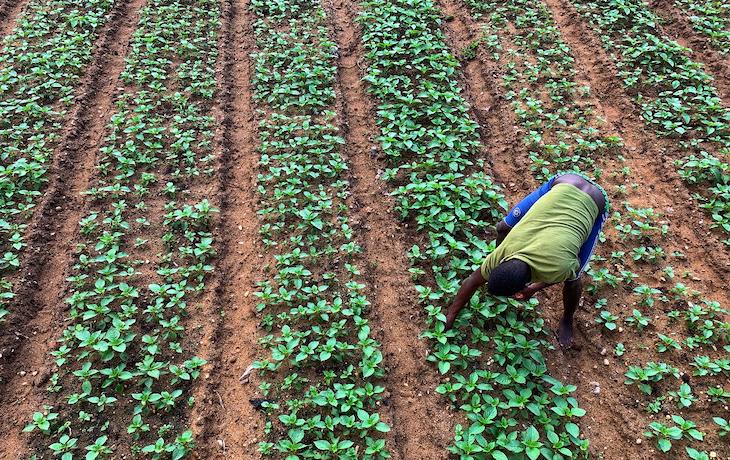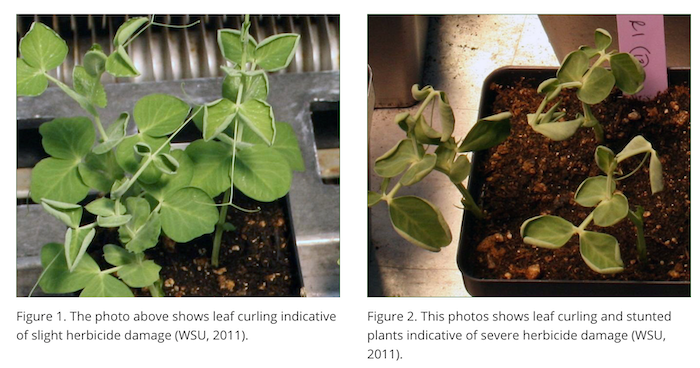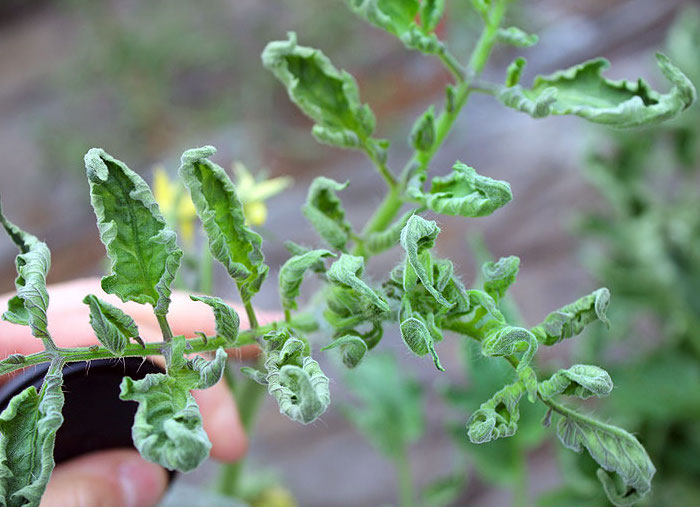Imagine undergoing the backbreaking labor of tilling your garden, mixing in compost and manure, and planting, only for your precious lettuce, tomatoes, potatoes, and peppers to curl up and not produce. Maybe this has happened to you, and if so, chances are it wasn’t your fault.
An herbicide called aminopyralid has contaminated many common organic amendments like compost, hay, manure, and straw, with growing chatter in the gardening community about this risk. And if you’re not careful, your soil could become poisoned for years to come.
This is something to pay attention to if you garden, or plan to, and purchase compost, manure, straw, or hay to use on your garden beds.
Unfortunately, it’s not as simple as avoiding products with “aminopyralid” on the label, because the chemical can work its way into your garden through unexpected paths.
Important bits:
- Aminopyralid is an herbicide often used in pastures and wheat fields, which damages or kills most plants except grasses.
- Aminopyralid takes years to break down and doesn’t break down in digestion or composting.
- While aminopyralid is in the soil, many common garden plants will not grow or produce well, if at all.
- The only sure ways to avoid aminopyralid is to only use compost, manure, straw, and hay from your own land, or test whatever amendments you buy.
What aminopyralid is and why it’s bad for your garden
Aminopyralid is a broadleaf herbicide used in pastures and wheat fields that kills all plants except grasses. It eliminates weeds and nuisances like thistles and brambles, leading to higher yields and “cleaner” straw and hay.
In the United States, it’s usually sold under the brand name Grazon. In the UK it’s sold as Banish, Forefront, Halcyon, Pharaoh, Pro-Banish, Runway, Synero, and Upfront.
The first garden threat from aminopyralid is it indiscriminately kills anything that isn’t grass. Dow Chemical, maker of Grazon, has a list of everything it might damage:
- Beans and other legumes
- Carrots and other umbelliferae
- Dahlias
- Lettuce, spinach, and other compositae
- Peas
- Potatoes
- Some species of roses
- Tomatoes
The reason Dow first published this list was in response to gardeners asking “will my plants be affected by this if aminopyralid is present in my manure?” In typical corporate fashion, Dow replies with no but then proceeds to share a victim list that includes pretty much everything you’d want to grow.
But what makes aminopyralid especially threatening to your garden is the fact that it’s long-lasting, taking anywhere from one to three years to break down (though there have been reports of it lasting a decade or more). Unlike many garden baddies like weeds, insect eggs, and some herbicides, it won’t denature or break down in a hot compost pile.
Imagine a cow in a field eating grass that’s been sprayed with aminopyralid. That grass reappears from the other end of the cow as manure, except contaminated by aminopyralid. You buy that manure from the rancher, put it in your garden, and next thing you know, your garden plants curl up and won’t produce. Dow acknowledges this:
When grassland is sprayed with aminopyralid, the target weeds are killed but the grass is not affected. However, when this grass is eaten by livestock, either out in the field or as feed such as hay or silage, a small amount of aminopyralid may be found in the resulting manure.
Dow insists that there are warnings on the herbicide packages that, if followed, will prevent aminopyralid from reaching your garden. But humans are not always great at following instructions.
Potentially contaminated products
Grasses sprayed by aminopyralid can potentially be contaminated. That also applies to any products derived from those grasses, such as:
- Compost
- Hay
- Manure
- Straw
Unfortunately, these are some of the most popular garden amendments. Straw, hay, and compost are all used as mulches. Manure and compost are used to fertilize and build soil.
You won’t find aminopyralid contamination in chemical fertilizers like 10-10-10 or Miracle-Gro. You’re also unlikely to find aminopyralid in organic amendments not derived from pastures, like:
- Alfalfa
- Blood meal
- Bone meal
- Cottonseed meal
- Fish meal
- Kelp meal
- Wood chips
Why is alfalfa not a high aminopyralid risk? Because it’s not a grass, it’s a legume like beans or peas.
What are the signs of aminopyralid contamination?
Dow points out, quite rightly, that not every plant death in your garden is attributable to aminopyralid. However, there are distinctive signs of aminopyralid contamination:
- Curled leaves and shoots
- Yellowing of leaves
- Dead leaves and shoots
- Poor germination
Aminopyralid usually doesn’t kill garden plants but causes them to curl up and fail to produce.
The most indicative sign is the distinctive curling and twisting of plants. However, there can be other causes of these symptoms. If only a few plants in a bed are exhibiting these signs, it may not be aminopyralid contamination.
Another sign is if corn and brassicas (like broccoli and cabbage) grow in a garden bed, but other plants will not. Both corn and brassicas are unaffected by aminopyralid.
Unfortunately, aminopyralid contamination isn’t merely theoretical:
- Mother Earth News collected numerous reports of contamination
- Gardner Karen Land was forced to grow in containers after accidentally contaminating her raised beds
- The Organic Growers Alliance documented some cases
- Cases in Montana
It’s unknown just how frequent this is, but it’s widespread enough that you should be prepared for it. You can Google “aminopyralid contamination” and find page after page of examples.
Avoiding the problem is the best policy
Multiple measures have been taken around the world to reduce aminopyralid contamination. It’s banned in some areas, and its use strictly regulated in others. However, that hasn’t been enough to stop garden contamination. Here’s what you can do to protect your garden:
- Make your own compost.
- Don’t import compost, straw, hay, or manure, especially the bagged stuff at the store.
- If you buy compost, straw, hay, or manure from a farm, ask the farmer what they spray on it. A good sign for hay is if has broadleaf plants mixed in with it.
- Be aware of what your neighbors are spraying. Some of it could drift onto your land and contaminate it.
But the only surefire way to avoid aminopyralid contamination is to perform a bioassay on garden amendments. You will need:
- Garden seeds sensitive to aminopyralid, such as peas, beans, or tomatoes
- Two potting plants or cups
- Seed starting mix
- The garden amendment to be tested
The process is simple. Fill two cups or pots, one with plain seed starting mix as a control and another with the to-be-tested amendment mixed in. If you’re testing hay or straw, chop it up and mix it in.
If you’ve never started seeds before, here are some quick guidelines:
- Make sure the container has small holes in the bottom for drainage.
- Water, but not too often. You want the soil to be damp, but not soaking wet.
- Seedlings need a lot of light. Put a lamp directly over them or put them out in the sun.
It’ll take about 30 days to perform the bioassay. You simply wait for the seeds to start growing and then wait to see if the test plant curls up.
Unfortunately, if you’re using bagged compost or manure, you really should test every bag to see if it’s contaminated because you don’t know exactly where each bag comes from.
How to fix aminopyralid contamination
If your garden is contaminated, there are a few things you can do:
- Remove the contaminated soil. This is the toughest option, and may just be out of the question. It’s easier if you’re growing in raised beds. You can set the soil aside and test it every year until the aminopyralid is gone.
- Add more compost to dilute it. This is the recommendation of the MIgardener YouTube channel. But, personally, I would be wary of contaminating perfectly good compost.
- Add water to dilute it.
- Wait for it to wear off. This could take years and years.
- Grow plants not affected by aminopyralid, like corn, wheat, and brassicas.
Out of all the options, I would probably choose the last one. At least that way I could still keep producing until the aminopyralid works its way out of the soil, and it might work out faster that way.
But if you want to avoid the stuff entirely, you’ll have to either remove it or grow elsewhere while it breaks down.
None of these are great choices. The best solution is to avoid it in the first place.



You are reporting the comment """ by on